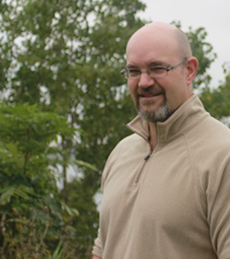How to save our planet
International conventions on climate change are held frequently. Rarely do they translate into concerted global action. Concordia researcher Peter Stoett hopes to remedy that while provoking discussion with his new book, Global Ecopolitics: Crisis, Governance, and Justice.

In its pages, Stoett argues that permanent solutions for environmental policies must be rooted in effective institutions at all levels. He offers a compelling exposé of the environmental challenges of our time and examines the enormity of the collective problems we face while looking at the many people, laws and policies dedicated to solving them.
While introducing readers to the actors and structures that create environmental policies, Stoett says the topic is personal. “Effective governance isn’t only the responsibility of governments. Individuals and communities need to step up to the plate and participate in the discussion,” he says.
There may be glaring gaps in the progress but Stoett still sees hope for the future. He says positive steps are being achieved and calls readers to work toward environmental justice.
“I was inspired by my undergraduate seminars to take things several steps further and produce a text covering environmental governance in a much broader sense,” explains Stoett, who is a professor of political science, a Fellow at the Loyola College for Diversity and Sustainability, and Senior Research Fellow with the International Human Dimensions Programme on Global Environmental Change, an international, non-governmental, interdisciplinary research program established by the International Council for Science and the International Social Science Council.

While Global Ecopolitics does not offer a quick cure for all that ails the planet, Stoett is careful to remind readers that it would be a mistake to divorce environmental concerns and solutions from international social justice. “After all,” he says, “policies without legitimacy in the eyes of immediate stakeholders have a limited shelf life at best, and can be considered imperialistic at worst. I hope to convey a twin message: much has been done, but if we are serious about our planet’s future, then there is much, much more to do.”
Global Ecopolitics will have a special launch on Wednesday, October 17 at the Loyola College for Diversity and Sustainability, Room AD-307, Administration Building (7141 Sherbrooke St. West). This free event begins at 5:30 p.m. and is open to the public. To RSVP, email loyolacollege.fas@concordia.ca by October 12.
Partners in research: Professor Stoett completed Global Ecopolitics while sitting as the Fulbright Visiting Research Chair in Canada-U.S. Relations at the Woodrow Wilson International Center for Scholars in Washington, D.C.
Related links:
• Global Ecopolitics: Crisis, Governance, and Justice (University of Toronto Press, 2012)
• Loyola College for Diversity and Sustainability
• Concordia’s Department of Political Science